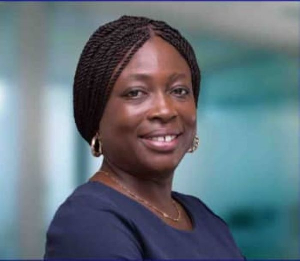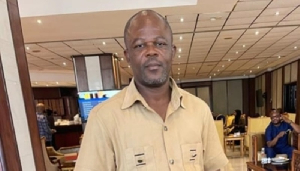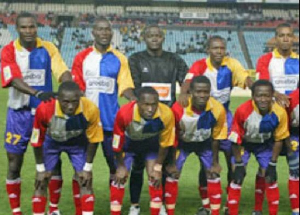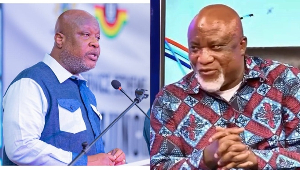 Evelyn Keelson, Chief State Attorney
Evelyn Keelson, Chief State Attorney
Jerome Agbesi Dogbatse, a senior research scientist at the Soil Science Division of the Cocoa Research Institute of Ghana (CRIG), continues to captivate the Accra High Court in the trial of ex-COCOBOD boss Dr Stephen Opuni and businessman Alhaji Seidu Agongo.
His recent testimony shed light on the lithovit foliar fertilizer, challenging claims made by the prosecution’s first witness, Dr Franklin Manu Amoah.
Mr Dogbatse’s testimony focused on testing procedures and sample handling protocols at CRIG, specifically regarding the lithovit fertilizer tested in 2013.
He stressed that Mr A.A. Afrifa, the Head of the Soil Science Division at the time of testing, was better positioned to understand the nature of the fertilizer than Dr.Amoah, the former head of CRIG.
Mr Dogbatse, explained that companies seeking product testing at CRIG usually provide samples directly to the Soil Science Division, where the division head oversees the testing process. He clarified that Dr Amoah, as CRIG head, would not necessarily be involved in the receipt and testing of samples.
In highlighting the chain of custody for samples, Mr Dogbatse affirmed that the head of the Soil Science Division would oversee the delivery and testing of samples, indicating that Dr Amoah’s direct involvement in sample handling would be unlikely.
Furthermore, Mr Dogbatse referenced Mr Afrifa’s testimony before the Adu-Ampomah Committee, affirming that the lithovit samples received for testing were in liquid form, contrary to the prosecution's claims.
During cross-examination, Mr Dogbatse reiterated that Dr Alfred Arthur, another key witness, had not raised any objections regarding the nature of the lithovit fertilizer during the testing process.
He emphasized that all testing procedures, including re-evaluation in 2016, were conducted meticulously and the findings indicated the effectiveness of lithovit.
The defence’s strategy appears to challenge the prosecution’s narrative regarding the nature of the lithovit fertilizer tested by CRIG and its subsequent use by COCOBOD.
Mr Dogbatse’s testimony emphasizes the intricacies of the case and raises questions about the reliability of previous assertions made by prosecution witnesses.
As the trial progresses, the court continues to gather evidence and testimonies, providing a clearer picture of the events surrounding the alleged fraudulent activities at COCOBOD.
The former COCOBOD boss, Dr Stephen Opuni and businessman Seidu Agongo, have been accused of defrauding by false pretenses, willfully causing financial loss to the state, corruption by public officers and contravention of the Public Procurement Act.
How companies apply for fertilizer testing
Mr Dogbatse said after a company applies through COCOBOD for a fertilizer to be tested, the application would end on the desk of the head of the Soil Science Division at CRIG.
The head of the division, would then write directly to the company to inform them of the quantities of fertilizer needed for the test and also of the cost involved in testing the product.
Mr Dogbatse, with over 10 years of working experience at CRIG, confirmed that when the additional samples are brought, they are delivered straight to the Soil Science Division, who will take delivery to conduct their test.
“And when it is delivered, it is the head of the Soil Science Division who will either take delivery of what had to be tested or authorize who should take delivery. That is the position. Is that not it?” Counsel for Dr. Opuni asked the witness, to which he affirmed, “That is correct.”
Mr A.A. Afrifa, in 2018, when he appeared before the Adu-Ampomah Committee, unequivocally told the committee that the lithovit he received from Agricult Ghana Limited for testing was liquid.
“No, chief, that one, I am 100% sure that what was brought to us was liquid in plastic containers, and I remember that it was liquid,” he insisted.
Therefore, Mr Dogbatse was asked, “The Executive Director of CRIG, at this point, cannot know the fertilizer that is to be tested because he will not be part of the chain of delivery of the fertilizer brought for testing.”
Mr Dogbatse answered, “Yes, at that point, that is correct.”
The witness also told the court he had no reason to doubt Mr. A. A. Afrifa, who took delivery of lithovit samples as the head of the Soil Science Division, and said that the lithovit he received for testing was a liquid fertilizer.
“Between the person who receives the sample to be tested directly from the applicant company and the head of CRIG, the Executive Director [Dr. Amoah], the person who receives it is in a better position with respect to the identity of the sample received and tested,” the witness was told.
Mr Dogbatse, who has personally received samples of fertilizers for testing at CRIG directly from the applicant companies, on the instructions of the head of the Soil Science Division, told the court, “Yes. That is correct.”
“It is therefore right to say that Dr Amoah, who was the then head of CRIG when the sample [of lithovit] was submitted for testing, did not see and or receive the actual samples which were tested because that is not part of his schedule,” Mr Codjoe told the witness.
Mr Dogbatse replied, “Yes. That is correct.”
Mr Dogbatse informed the court that he was present together with the second prosecution witness, Dr. Alfred Arthur, at the Adu-Ampomah Committee when Mr Afrifa repeatedly told the committee that he was “100 per cent certain” that lithovit he received for testing was liquid.
Mr Dogbatse has further told the court that after a re-evaluation of lithovit fertilizer was conducted in 2016, in which he actively participated, the final report submitted to CRIG’s Committee for Testing Chemicals and Machines (CTCM) stated clearly that lithovit is a liquid fertilizer.
Interestingly, he informed the court that Dr Alfred Arthur was a member of the CTCM that reviewed the re-evaluation report in 2016 and passed it for certification without raising any reservations concerning the nature of lithovit being described as a liquid.
The prosecution argues that the Lithovit Foliar Fertilizer that CRIG tested and approved for use was powdery, but COCOBOD bought a liquid product from Agricult Ghana Limited between 2014 and 2016, which they claimed had never been tested by CRIG.
Dr Arthur testified in court in 2018 that the lithovit he tested with other soil scientists was powdery.
“We were expecting to find lithovit foliar fertilizer in a powdery form; however, what we picked from the field was a liquid substance. The Soil Science Division has never tested a product by the name Agricult Liquid Lithovit Foliar Fertiliser,’’ the state-owned Daily Graphic quoted Dr. Alfred Arthur on its website as telling the court in November 2018.
“Dr Alfred Arthur, to your knowledge, as of 2016, was a member of the CTCM,” Samuel Codjoe asked Mr Dogbatse under cross-examination. The witness replied, “Yes, my lord.”
“And when you, Jerome Agbesi Dogbatse, sent your re-evaluation report, you stated clearly that lithovit is a liquid fertilizer to the CTCM in your report,” the witness was asked.
“Yes. In the report of the evaluation team and not Jerome Agbesi Dogbatse’s report,” he responded.
He was further asked, “In fact, Dr. Alfred Arthur never complained to you in 2016 that the lithovit which you evaluated as part of the team whose report was sent by the evaluation team to the CTCM was not liquid?”
The witness reiterated in his response, “Yes, he never complained.”
Mr Dogbatse, who is pursuing his Ph.D. in soil science, also told the court that Dr Arthur “never complained” to him or anyone at CRIG that lithovit, which he, together with other scientists, tested, was not liquid.
“I am putting it to you that as scientists, when it comes to fertilizer if what Dr Alfred Arthur together with others tested when lithovit was sent to CRIG for testing was not liquid, he would have immediately complained to the CTCM with respect to what was re-evaluated,” counsel stated.
“Yes that is obvious, he will do that,” the witness answered.
The witness also confirmed that all the processes for the re-evaluation for the renewal certificates for fertilizers were followed during the re-evaluation of lithovit in 2016.
According to Mr Dogbatse, the re-evaluation of lithovit in 2016 also found the product to be effective with respect to the nutrients.
- Attorney-General's defense of Chief Justice severely criticized by Prof Kwaku Azar
- Unexpected change in Opuni's appeals panel by Chief Justice sparks murmurs in Ghana's Supreme Court
- Alfred Arthur was part of CRIG’s CTCM that passed lithovit as liquid fertilizer – Witness tells court
- COCOBOD retirees were re-hired to prosecute Opuni, Agongo - Agongo's lawyer tells court
- I’m 100% certain lithovit submitted to me for testing at CRIG is liquid – Lead scientist
- Read all related articles












